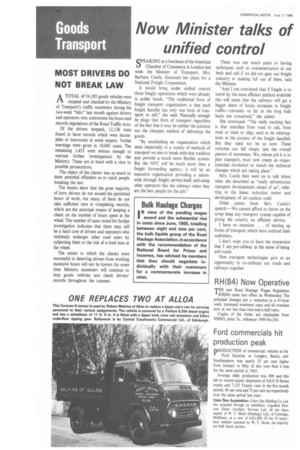Now Minister talks of unified control
Page 44

If you've noticed an error in this article please click here to report it so we can fix it.
SPEAKING at a luncheon of the American Chamber of Commerce in London last week the Minister of Transport, Mrs. Barbara Castle, discussed her plans for a National Freight Corporation.
It would bring under unified control those freight operations which were already in public hands. "The traditional form of freight transport organization is that each freight handler has only one form of transport to sell," she said. Naturally enough he plugs that form of transport regardless of the fact that it may be neither the quickest nor the cheapest method of delivering the goods.
"By establishing an organization which deals impartially in a variety of methods of transport we aim to break with that tradition and provide a much more flexible system. But the NFC will be much more than a freight forwarding agency; it will be an executive organization providing a nationwide through freight service itself, and using other operators like the railway i when they are the best people for the job." There was not much point in having techniques such as containerization at our beck and call if we did not gear our freight industry to making full use of them, said the Minister.
"And I am convinced that if freight is to travel by the most efficient method available this will mean that the railways will get a bigger share of future increases in freight traffic—certainly so far as the long bulk hauls are concerned," she added.
She continued: "The really exciting fact is that transfers from road to rail, from road or train to ship, used to be interruptions to the journey of the freight handled. But they need not be so now. These switches can fall simply into the overall pattern of movement. We, whose job it is to plan transport, must now create an organizational revolution to match the technical changes which are taking place."
Mrs. Castle then went on to talk about what she described as "really adventurous transport developments ahead of us", referring to the linear induction motor and development of air-cushion craft.
Other points from Mrs. Castle's speech:—We cannot .afford to throw on the scrap heap any transport system capable of giving the country an efficient service.
I have no intention . . of shoring up forms of transport which have outlived their usefulness.
I don't want you to have the impression that I am pro-railway in the sense of being anti-roads.
New transport technologies give us an opportunity to co-ordinate our roads and railways together.




















































































































































